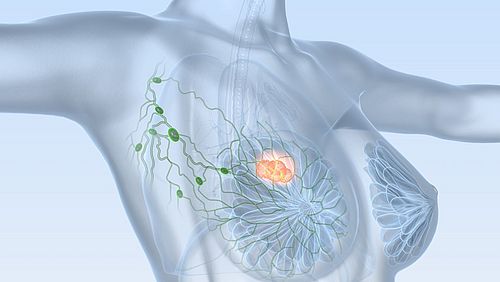10 July 2025
Genomic testing in breast cancer: new findings from the TAXIS study
In personalized breast cancer therapy, genomic tests provide valuable information about the risk of recurrence and help to plan targeted treatment strategies. A new sub-study of the international TAXIS study led by Prof. Walter P. Weber now shows that not every tissue sample is equally informative.
Tests such as MammaPrint and BluePrint analyse the activity of certain genes in tumour tissue. This makes it possible to better assess the risk of a relapse and the benefits of chemotherapy. In clinical practice, breast tumour tissue is not always available in sufficient quantity to perform such a test. In some cases, lymph node tissue has therefore been used as an alternative source for such tests. The suitability of lymph node tissue for genomic analyses was questioned in the new sub-study.
Deviating test results - with clinical consequences
The study shows: In around one in six cases, the tests in the lymph node provide a different risk profile than in the primary tumour. This can have concrete consequences for treatment: Patients could be treated unnecessarily intensively or receive inadequate therapy.
Conclusion: primary tumour remains the gold standard
The study concludes that lymph nodes should only be used with caution as a basis for genomic tests. Whenever possible, primary tumour tissue should continue to be used. These findings complement earlier results of the TAXIS study, according to which complete removal of the lymph nodes has no influence on the choice of systemic therapy.
The new publication builds on a partial study published in JAMA Surgery in 2023. While the focus then was on the surgical approach, the molecular analysis is now coming to the fore. Together, they strengthen the goal of the TAXIS study: to enable a gentler but targeted treatment of breast cancer.

«Our new data show that we can not only avoid side effects with targeted, gentle approaches, but also make well-founded treatment decisions - if we use the right samples.»
Prof. Walter P. Weber, Principal Investigator, Medical Head of Department and Chief Physician of Breast Surgery at the University Hospital Basel

Genomic analysis of tumour and lymph node tissue in breast cancer patients with affected lymph nodes
A subproject of the TAXIS study
Principal Investigator
Prof. Walter P. Weber, Chief of Breast Surgery, Head of Department Breast, Abdomen and Pelvis, University Hospital Basel
Study design
Predefined sub-study within the international randomized phase III TAXIS study
Study centres
26 study centres in five countries (Switzerland, Hungary, Austria, Germany, Lithuania)
Patients
89 patients with clinically node-positive breast cancer (stage II/III)
Project duration
11/2019-02/2021
DKF-Scientific Services
Regulatory affairs, project management, data management, monitoring, IT services
Original publication
Genomic profiling of primary tumor and lymph node metastasis in patients with clinically node-positive breast cancer: prospective cohort study within TAXIS (OPBC-03, SAKK 23/16, IBCSG 57-18, ABCSG-53, GBG 101)
Eur J Cancer. Published online June 18, 2025. doi: 10.1016/j.ejca.2025.115585.
Further information
TAXIS study on clinicaltrials.gov
Oncoplastic Breast Consortium (OPBC)
